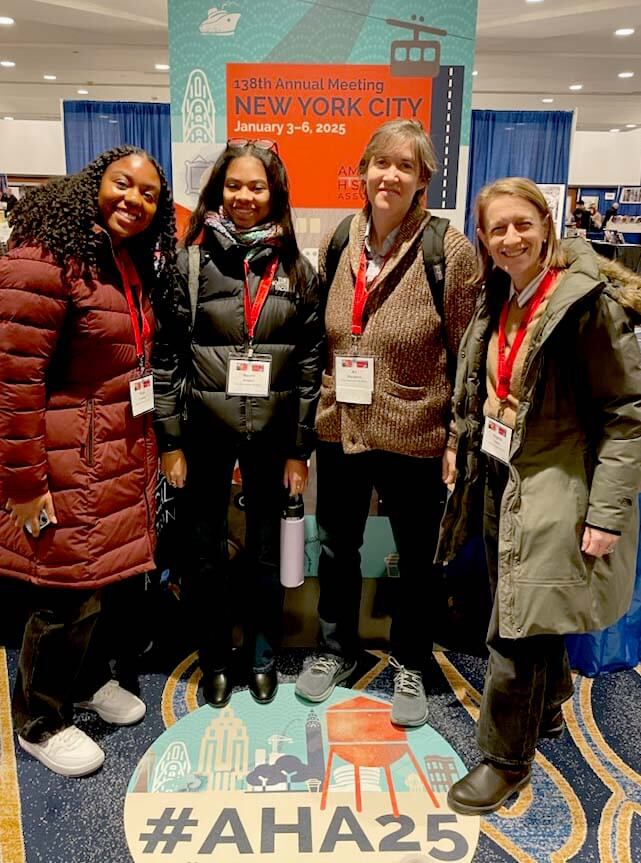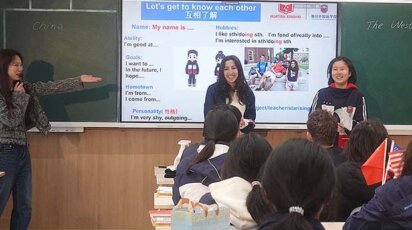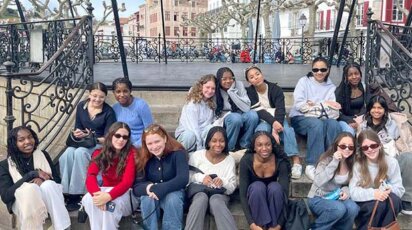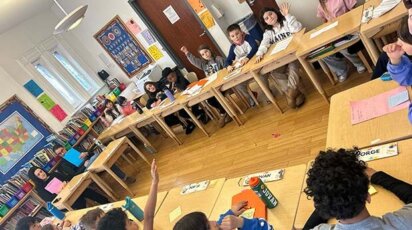News
History Club Attends Premier Conference in New York City
“Going to a professional conference like the [American Historical Association] Annual Meeting allows [students] to get a fuller understanding of the discipline of history and how professional historians really enjoy the different ways that they approach subjects, reveling in disagreements and new approaches.” – History Department Chair Virginia Dillon
During the first week of the new year, on Sunday, January 5, History Department Chair Virginia Dillon, History faculty AJ Blandford, Naomi Bobbitt ’27, and Kaya Freeman ’26, attended the annual meeting of the largest national gathering of historians, scholars, and professionals who work in numerous fields across the country. Hosted by the American Historical Association (AHA) since 1884 and held in New York City, attendees gather annually to share research and participate in professional development, learn about the discipline, and network with other scholars from around the world. The conference provides important exposure for Poly students. They can learn from professional historians or historians in training, while deepening their understanding of the topics that presenters have researched as well as get insight into their expert methods for research and analysis.
The conference was filled with engaging panels that covered a variety of topics. Bobbitt attended “Powerful Objects: Colonial and Postcolonial Politics in and from the Global South,” Freeman went to “Black Women and Mass Incarceration: Then and Now,” Blandford joined “Mining Women in Europe and the Americas,” and Dillon attended “Whose Independence? Declarations of Independence during the Era of the American Revolution.” Other sessions attended included “What Is History in the Age of AI? A Conversation about Historical Research and the Archives” and “Investing in Ourselves: Black Community Building and Economic Uplift in the Mid-20th Century.”

Freeman shared her enthusiasm for the opportunity to explore new ideas: “I went to the conference simply hoping to learn something new about topics that I haven’t studied. I found Dr. Dara Walker’s presentation, ‘Aging in the Postwar City: Black Senior Citizens as Movement Actors’ compelling and thought-provoking. It was interesting to hear about how age has often been overlooked in historical analysis but [demonstrated] how crucial Black elders were during the Black Panther and Black Power Movement.” Reflecting on the broader experience of the conference, Freeman said, “ I enjoyed going to the AHA Annual Meeting because I was able to learn about topics of incarceration and economic uplift, both of which I didn’t know much about before attending, and I learned how historians have conducted research through archives to produce their work.”
Dillon noted that the conference was inspiring. “I’m always reinvigorated attending conferences where I have the opportunity to hear more about the questions and debates happening in the world of historical research and scholarship right now. I leave each session full of ideas, reading lists, and questions.”
For both faculty and students, the shared experience of attending the conference fosters meaningful dialogue. It allows them to discuss topics students are deeply passionate about as well as fresh insights gained from the day’s sessions. As they walked between panels, Dillon spoke of her conversation with Bobbitt. “It was great learning from her about how indigenous textiles were turned into currency during the Spanish colonial period and what questions that raised about value and relationships in those communities.” Following another panel, the pair shared “thoughts and experiences with archival research and AI use and debriefed [about] the interesting ways that these historians understood their work and [at times] disagreed with each other.”
As History Club students engage in original research at Poly, the conference afforded them a deeper understanding of what the practice and training of professional historians entails. AHA meetings offer unique exposure to history as both a discipline and a profession, introducing students to diverse approaches to various subjects. A highlight for many students was the opportunity to network—whether by debriefing with peers about insights from their chosen panel sessions, meeting colleagues of their teachers, or exploring the wealth of resources available in the Book Hall.
Blandford enjoyed the chance to reconnect with peers from her graduate studies, and introduce students to presenters of the conference with whom she had a personal connection. “The best part of attending the AHA this year was being able to attend a panel on ‘Black Community Uplift in the Mid-20th Century’ in which two of my grad school friends were presenting some of their new research. It was great to catch up with them, learn about their latest research and be able to introduce one of my former students, Kaya Freeman, to the panelists.”
For faculty, experiences like this elevate plans for classroom learning. The information presented at the conference has Blandford already generating new ideas to incorporate into the curriculum. “I was able to attend a panel on ‘Mining Women in Europe and the Americas’ that reflects my own research interests, and a panel on Nigerian history to gain a deeper understanding of the Nigerian Civil War which we cover in my global history elective, ‘Decolonization in the Age of the Anthropocene.’ I always love learning more about all aspects of history and these panels are an opportunity to get a window into the really unique and specific nooks and crannies of other people’s research.”



